
1 minute read
Engage, Equip, and Empower: An Ashley Hall Education
AN ASHLEY HALL EDUCATION
BY MARY B. WEBB ’76 , UPPER SCHOOL FACULTY MEMBER
As an Ashley Hall graduate and current Upper School History Department faculty member, Mary Webb ’76 brings a unique perspective, a wealth of experience, and a keen insight to her classroom. After graduating from Clemson University with a Bachelor of Arts degree in Elementary Education, she earned her Juris Doctor from the University of South Carolina School of Law. After practicing for nearly two decades, she transitioned into education and has taught at Ashley Hall since 2001. Ms. Webb has previously served as Chair of the History Department and is currently an Honor Council Faculty Representative.
ndependence of thought and diversity of opinion must be fostered under the same roof, within the same system, as they are crucial to a liberal arts education. It takes courage and resilience to live in today’s society where opinions can differ on even the most fundamental ideas about what our school and wider community should stand for. Ashley Hall promotes the development of brave and independent women who, in a variety of ways, not only live life to the fullest but also enrich and improve the lives of their families while furthering the success of the communities in which they live. The contributions of our alumnae and current students on a variety of fronts are highly individualized, frequently transformational, and sometimes even revolutionary. Ashley Hall women aspire to embody the idea of civic virtue through their ethical service locally, nationally, and internationally. We may not all speak with the same voice, but each individual has learned and earned the ability to express herself clearly, and with conviction.
Ashley Hall’s Mission Statement calls for us to empower educated women who are independent, ethically responsible, and prepared to meet the challenges of society with confidence. The ability to engage in civil conversations enhances the success of every civic engagement. For women who want to foster change, or seek to preserve a status quo in which they believe, it is crucial that they understand how the world works. Gradual acquisition of these skills at developmentally appropriate stages through our Learning Spiral leads to increased knowledge of the world, a deeper understanding of the issues at hand, and, ultimately, the ability to hear, process, and respond with an open mind to opposing points of view.
Experience shows that without civil discourse, time and energy can be wasted in fruitless conversations that can stifle individual voices and hinder growth. Harkness discussions and increased attention on civil discourse provide structure for student conversations across the curriculum. It takes time, practice, and patience for each student’s voice to develop and evolve. We encourage the growth that will continue over their lifetimes. In the classroom, extensive use of primary sources throughout the curriculum encourages students to evaluate
“At some point, every Ashley Hall student and graduate will engage, in line with her own convictions, in some controversy or disagreement. She will be ready. ” the source itself, not just the commentary on that source that reflects the opinion of others. Instruction across all disciplines leads to the same goals, providing students the opportunity to equip themselves with the ability to voice original thoughts, to write clearly and persuasively, to argue both passionately and dispassionately, to discern the truth, and to act accordingly.
Ashley Hall’s goals are in line with that of the Center for Civic Education which seeks to foster crucial skills in order to equitably develop enlightened citizens. Enlightenment happens best with the opportunity for exposure to different points of view. For faculty at Ashley Hall the realization that we as teachers of girls need to be flexible to evolve and adjust our instruction to achieve equity within our own classrooms is particularly poignant. The goal is that our students will absorb the availability and necessity of an even playing field and expect that equality of opportunity throughout the rest of their own lives. If they do not find it, we have faith that they have acquired the necessary skills so that they can help create it themselves.
The search for equity and equality was highlighted this year with Ashley Hall’s celebration of the ratification of the XIX Amendment to the United States Constitution. Students actively engaged in studying the history behind it and participated in a march to celebrate the recognition of this fundamental human right, the right to vote for those who seek to represent you. It is no accident that Ashley Hall’s founder, Mary Vadrine McBee, was one of those who persevered in seeking the right for women to vote using every weapon in her arsenal. She was a risk taker, speaking out in support of the XIX Amendment soon after Ashley Hall was founded. Ms. McBee took steps to make real the ideal of equality at a time when she was relatively new to the Charleston community and a voice of the minority. We advocate for our students to embody that same conviction when pursuing their own causes. Honor in this pursuit is also key to the concept of civic virtue. Those who serve their community best do so in a forthright, ethical, and transparent manner. Ashley Hall’s Honor Code, a pledge that students sign in a formal ceremony, states that Ashley Hall students shall not, “lie, cheat, or steal nor tolerate those who do.” Students have the opportunity to serve on Honor Council and offer guidance to their peers as they also serve as role models. Students aspire to act honorably in all aspects of their lives, which lays the foundation of trust necessary for open and civil engagement in school life.
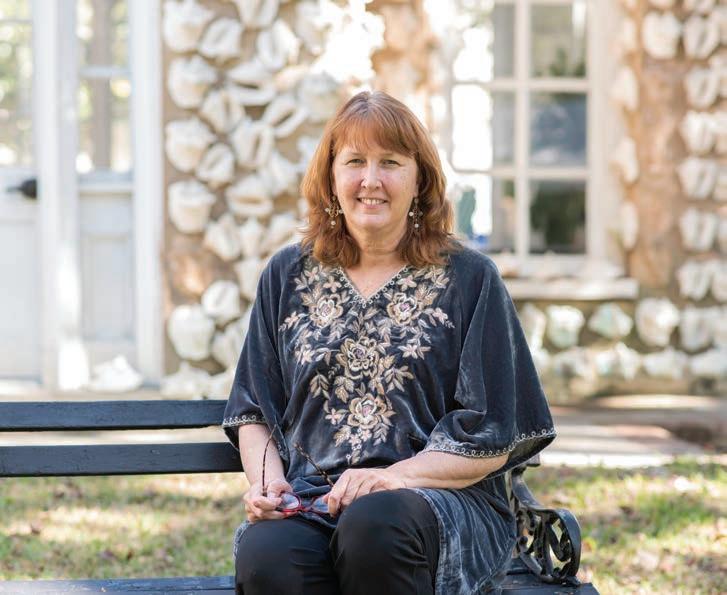
| Photo by Kelly Grace Photography | Opposite: Upper School faculty member Mary Webb ’76 leads a discussion with her eighth graders during history class. Photo by Meredith Frazier
Through our Hallmarks, which include the qualities of compassion, intelligence, worldliness, creativity, the ability to collaborate, purposefulness, and the ability to be discerning, Ashley Hall aspires to prepare students to be active, not passive, participants in life’s journey. Practice of civic virtue in our school community seeks to mirror the practice of civic virtue in the wider world. Skills based on ethical conduct must have and will have practical applications beyond our walls. Every student is offered the means to express the courage of her convictions. Ashley Hall’s end goal is always to improve each woman’s quality of life long term. At some point, every Ashley Hall student and graduate will engage, in line with her own convictions, in some controversy or disagreement. She will be ready.
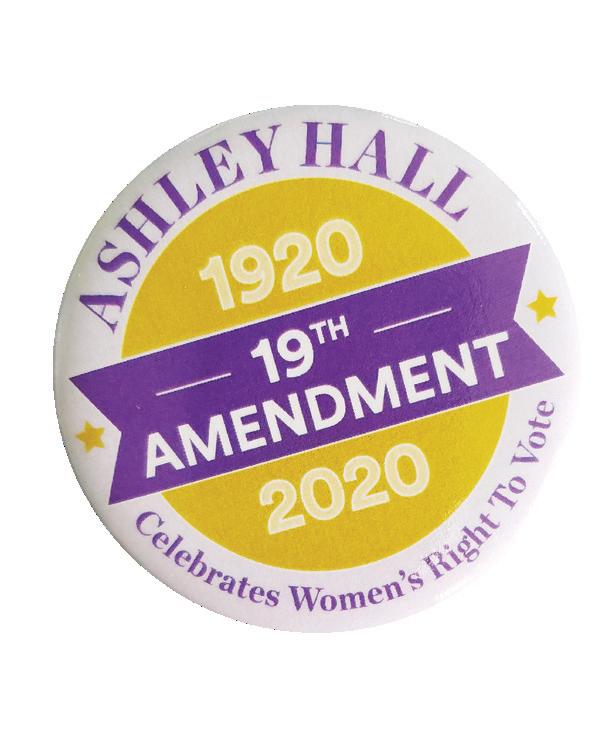
Voices, Votes, Visionaries: &
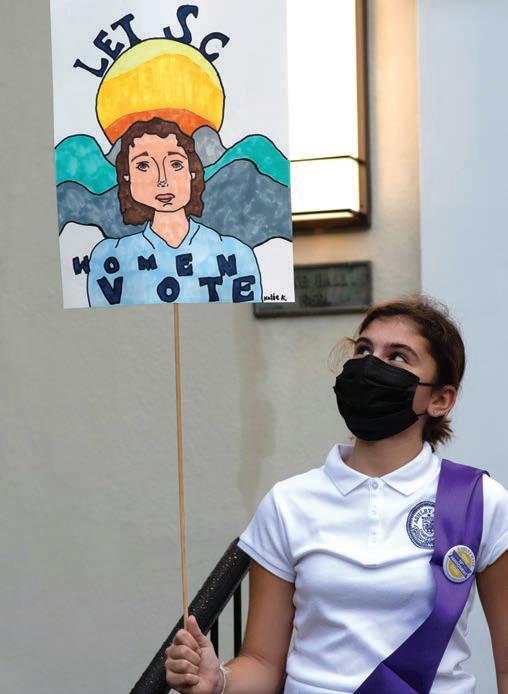
ASHLEY HALL CELEBRATES THE 19TH AMENDMENT
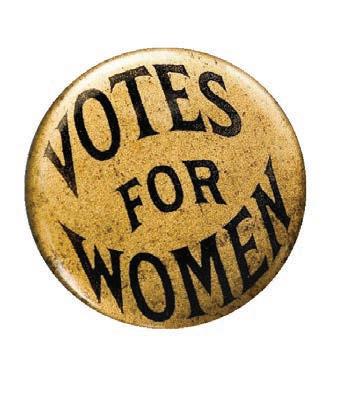
By Jennifer Turner, Editor & Director of Content
A school that prepared women to be leaders before they could even make their voices heard through the vote: this was the challenge Mary Vardrine McBee faced when she founded Ashley Hall in 1909, more than a decade before the ratification of the 19th Amendment. Her carefully crafted mission statement— “To produce educated women who are independent, ethically responsible, and prepared to meet the challenges of society with confidence”—was drawn from personal experience.
As a young woman who had grown up under society’s opposition to the women’s suffragist movement and who had experienced unjust limitations, Miss McBee knew firsthand the struggles women faced. She was determined to have a hand in preparing the next generation: the girls who would become the leaders in a new era.
In 2020, as Ashley Hall celebrated the 100th anniversary of women earning the right to vote, it also examined the 19th Amendment’s significance to the School’s legacy. Today, the vital need to fulfill Miss McBee’s mission could not be stronger, and Ashley Hall continues in its founder’s footsteps by nurturing the next generation of female leaders in Charleston and beyond.
This past fall, Ashley Hall proudly hosted 100 Years After the 19th Amendment: Their Legacy, and Our Future, a national traveling exhibit curated by the American Bar Association and the Library of Congress that honors the women’s suffrage movement. On campus October 5 through 9 during the School’s celebration of Founder’s Week, the award-winning exhibit featured photographs of historic documents and artifacts and detailed the story of the battle for ratification and the challenges that remain.

As part of Ashley Hall’s programming for the exhibit, Upper School History Department faculty member Chris Frisby addressed students on the lasting importance of the 19th Amendment and its relevance to them, both now and in the future. “I hope you will take time these next few days to pause to review the interpretive banners and reflect on the history of a movement that has profoundly shaped and benefited your own lives,” he said. “When we think and speak about the 19th Amendment, I always encourage students to work from the idea that women earned the right to vote through the 19th Amendment. I discourage students from making statements like, ‘The 19th Amendment gave women the right to vote.’ This seemingly small difference matters. I do this because it is critically important to acknowledge the agency of women in working to advance their own rights.”
In addition to tracing the history of the women’s suffrage movement leading up to the ratification of the 19th Amendment, the exhibit also delved into the century that followed, including the continued restrictions and prejudice faced by women of color. “Significantly, the struggle for the right to vote did not end in 1920, with women of color experiencing disenfranchisement and discrimination for decades afterward, roadblocks that persist in our society even today,” said Head of School Jill Muti. “Being a woman, especially one who has the confidence to voice her opinion and stand up for what she believes, has never been an easy undertaking.”

Displayed at several locations around campus, the presentation particularly resonated across divisions with students, who immediately connected with its unique significance to an all-girls’ school. “I believe it is important to learn about the movement so that we appreciate how much we have now compared to 100 years ago,” affirmed Maya Opoulos ’27. “It has changed so much in just 100 years, and we should learn about it to appreciate what we have and what they didn’t but fought for.”
Watch History Department faculty member Chris Frisby’s presentation “Ashley Hall Honors Women’s Right to Vote” by visiting ashleyhall.org/19thAmendment
| L-R: Cayla Johnson ’30 views the ABA exhibit in the LoDome. Photo by Paula Harrell | Cate Altman ’28 takes notes for an essay. Photo by IP faculty member Olivia Hipp ’10 | Opposite: Katie Khan ’26 proudly displays her sign during the Suffrage March. Photo by Meredith Frazier
The Agitators: HISTORY COMES TO LIFE THROUGH THEATER
When Charleston’s PURE Theatre shared its highly regarded production of playwright Mat Smart’s The Agitators with Ashley Hall last February, it gave the Upper School a valuable opportunity to learn more about the early history of the women’s suffrage and abolitionist movements as well as the longstanding yet complicated friendship of Susan B. Anthony and Frederick Douglass. Directed by PURE Artistic Director and Ashley Hall parent Sharon Graci, the play brought to life significant moments in American history and effectively manifested the struggles of both women and African Americans for freedom and equality in the latter half of the 19th century. “The Agitators was a wonderful opportunity for students to explore critical conversations about equity and justice through the dynamic conversations between Frederick Douglass and Susan B. Anthony,” said Academic Program Coordinator Carolyn Newton. “The play explores the friendship between these two historical figures as it developed over their lifetimes, and yet it is quite relatable to current conversations and a 21st century focus on racial and gender parity. We are so grateful to Sharon Graci and PURE Theatre for making this experience available to us.”
For more information on PURE Theatre’s current season and educational outreach initiatives, visit PureTheatre.org

“We the Women”: A SPECIAL POST AND COURIER SERIES
In celebration of the 19th Amendment, The Post and Courier’s “We the Women” video and podcast series launched in August and featured interviews with outstanding women in South Carolina who discussed the women’s movement and the ways they have used their lives, voices, and right to vote. As one of the women spotlighted, Ashley Hall’s Head of School Jill Muti discussed the School’s unique ties to the women’s suffrage movement and the path ahead for the female leaders of tomorrow. “For me personally, it has created this drive at the School to continue that legacy—the legacy of advocacy— of being grounded in community and place, of understanding the importance of beauty in the lives of everyone and what it means to be a citizen and civically responsible, not only for ourselves but for others,” Muti emphasized.

To watch the full interview, visit ashleyhall.org/19thAmendment
| PURE Theatre’s performance of The Agitators at Ashley Hall. Photo by Meredith Frazier | Opposite: Upper School orchestra students during the filming of the Upper School Fall Concert. Photo by Kelly Grace Photography
UPPER SCHOOL FALL CONCERT PAYS HOMAGE TO THE Women’s Suffrage Movement
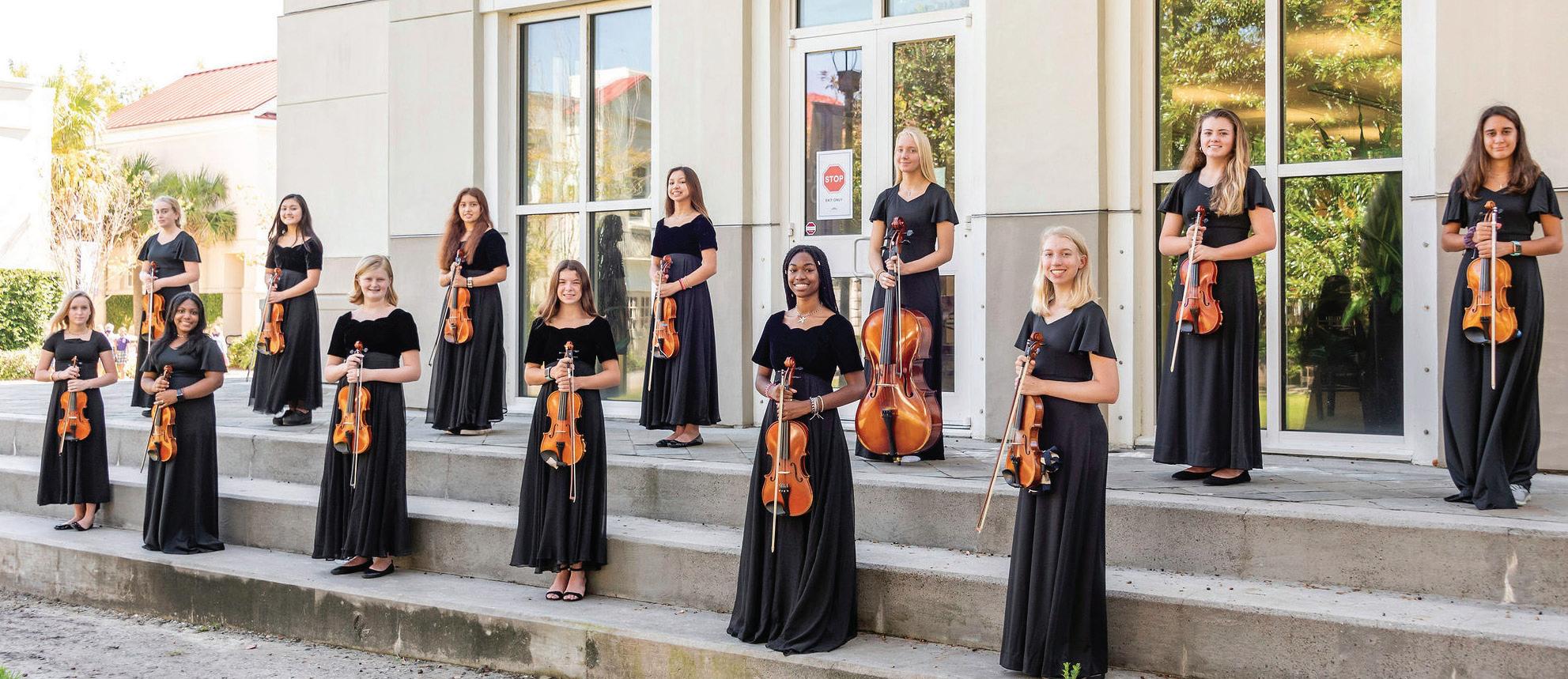
Presented in a digital format, the Upper School Fall Concert paid homage to the ratification of the 19th Amendment and the ongoing struggle to protect its legacy. In a nod to female composers, whose works were not regularly performed publicly at the beginning of the 20th century, the Red Choir and Chamber Choir sang “Faith is the Bird that Feels the Light” by Empowering the Next Generation Last semester, a group of Upper School students joined their peers across the nation for a weekly series of online civic engagement workshops held in honor of the 100th anniversary of the 19th Amendment. Sponsored by the Close Up Foundation and the Institute for Social Impact, the educational program Empowering Female Voices sought to inspire the next generation of female change-makers. “The sessions were to encourage us as young women to speak up and to not be afraid to share our opinions, and it was interesting to hear the opinions and perspectives of many girls around the country,” said Julia Richards ’23. Prior to each session, students read articles concerning current issues, and after meeting together as a large group of approximately Elizabeth Alexander. The song “This Little Light of Mine” was sung by the Red Choir, Chamber Choir, and Nautilus Choir in honor of Fannie Lou Hamer, a civil rights activist who fought to ensure the right to vote for all American women, including disenfranchised women of color. To watch this special
of Leaders
performance, visit ashleyhall.org/19thAmendment
150 participants, they divided into breakout rooms to deliberate their findings and potential next steps.
“In the deliberations, our goal was to reach a common ground in our opinions toward solutions,” noted Ellerbe Mendez ’23. “We discussed racial inequality, criminal justice reform, healthcare, impacting the community, and storytelling and advocacy. I do think that this format was helpful in expanding my perspective because deliberations allowed us to share our knowledge and opinions on the topic without debating them, so we felt encouraged to ask questions as well as share knowledge and opinions. Most importantly, it was an environment where I felt comfortable openly having my opinion changed.” Students found that the collaborative nature of the workshops was key in promoting meaningful engagement with the issues. “The workshops have encouraged me to want to learn more about what I believe in so that I understand why I believe the things that I do, and to truthfully speak out on those topics,” asserted Richards.
As part of her work with Close Up, Ellerbe Mendez ’23 joined nine other students nationwide for a special partnership with PBS NewsHour Student Reporting Labs. During the special fall workshop, students divided into teams of two to develop their video production and storytelling skills and create videos that highlighted diverse youth perspectives on current issues. Students presented their finished videos to educators and community members during a special showcase. PQV!
The Power of the
THE LEAGUE OF WOMEN VOTERSVote:

During a special Assembly in early March, Upper School students learned more about the League of Women Voters and its pivotal role over the last century in ensuring voter rights and supporting active participation in government. Ashley Hall alumna and women’s rights advocate Jennet Robinson Alterman ’70 led the presentation and shared important initiatives, including advocating for the College of Charleston to admit women in 1917, undertaken by the League and its early members. “In Charleston, there were four women who were extremely involved in getting women the right to vote, and one of them was Mary Vardrine McBee,” said Alterman. “She was an activist and an agitator, and she didn’t put up with anybody’s guff. A truly brave woman, she founded Ashley Hall in 1909, eleven years before women had the right to vote.”
In addition to learning about the League’s history and its current advocacies, students particularly responded to Alterman’s call to fully embrace civic engagement. “Here is my challenge to seniors,” said Alterman. I want five of you to be elected to an office within ten years. That will be in 2030, which is plenty of time. Whether you “ start with a PTA Board or a local city council, it is not hard Afterward, students were given the opportunity to register to vote. “Voting is something you have to do as an American citizen,” said deRosset Thompson ’20, who was already registered. Lauren Letton ’21 agreed. to run for office. And as Ashley Hall students, you have been trained to be leaders. ” “I’m registering today because I want to use my right to vote,” she said. “It’s important.”

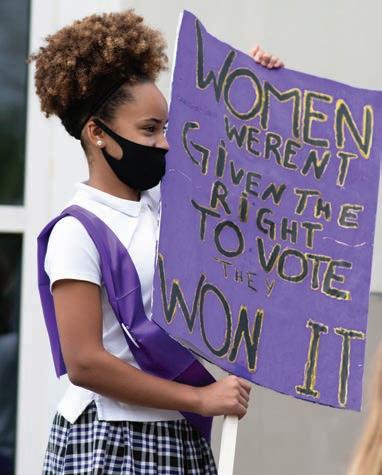
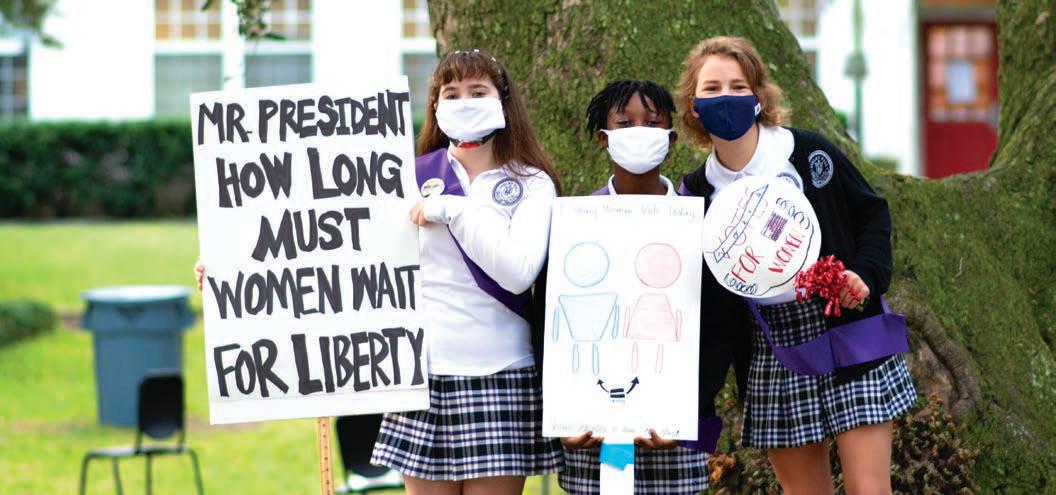
Signs of the Time: Ashley Hall’s Suffragist March
As the culmination of their studies of the women’s suffrage movement, sixth and seventh graders led a campus march where they celebrated the 19th Amendment and women’s right to vote. In addition to creating their own historically-inspired protest signs and wearing the colors of the movement (purple and white!), students shared with peers and faculty members their research about key suffragists and historic events. For many of the girls, it was a chance to imagine walking in the shoes of generations of courageous women whose efforts changed the course of history and to envision their own futures as leaders.

Stepping into History: Teaching the Suffragists
Q&A: MELANIE GIBSON
As an Intermediate Program faculty member, Melanie Gibson teaches sixth grade history, including a significant unit on the women’s suffrage movement. Her students researched movement leaders, primary documents, and political cartoons to gain a better understanding of this significant period in history.
WHY IS IT IMPORTANT FOR THE WOMEN’S
SUFFRAGE MOVEMENT TO BE PART OF THE
HISTORY CURRICULUM FOR SIXTH GRADE?
“This unit is part of the United States history timeline we are studying. It is important that the girls have a good understanding of the difficulties and mindsets women had to overcome to just get the right to vote. The struggles and indignities they had to suffer were intolerable, but they stuck with it and never relented. This is a good example for the girls to understand why it is important not to submit to the pressures of those who do not want to listen to all points of view. It shows them that working toward a goal, no matter how difficult, is worth the effort, especially if the result will affect the lives of people in the future and improve their own existence.”
A HIGHLIGHT OF THIS UNIT INVOLVES STUDENTS
CREATING TIMELINE ENTRIES TO DISPLAY THEIR
RESEARCH. HOW DO STUDENTS APPROACH THIS
PROJECT?
“The timeline features the women who were paramount in making an impact and achieving the goal of women’s suffrage from the 1850s to 1920. The girls selected either a suffragist, a primary document, or a political cartoon from sources such as the Library of Congress, the Smithsonian, and databases listed on the Ashley Hall library website. They also used text sources available to them in my classroom. One source is Don Nard’s The Split History of the Women’s Suffrage Movement, a flip book which features perspectives both for and against women’s suffrage. My focus was for them to use specific research sources other than Google. They worked in pairs to find information from both points of view, for and against the movement.”
WHAT WAS THE INSPIRATION FOR ASHLEY
HALL’S SUFFRAGIST MARCH?
“The march was an idea that [Director of the Nautilus Program and Upper School faculty member] Chris Hughes suggested to celebrate the 100th anniversary of the 19th Amendment. She had her seventh grade English classes write about suffragists from South Carolina. Her girls did research to write up information about these women to share with the sixth graders, and the sixth graders shared one-liners about information they learned from their research. They were stationed in different locations by the Rivers library, McBee House, and Lane Hall. All the girls made signs, and sixth grade girls made picket signs that were authentic copies of the same picket signs the suffragists created for their demonstrations. Both the sixth and seventh graders wore their white uniform shirts with purple banners. These were the colors the suffragists often wore when they demonstrated.”
CLASS OF 2027: WHAT DID YOU ENJOY MOST ABOUT STUDYING THE WOMEN’S SUFFRAGE MOVEMENT?
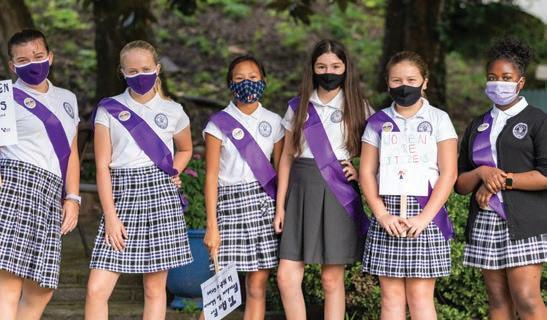
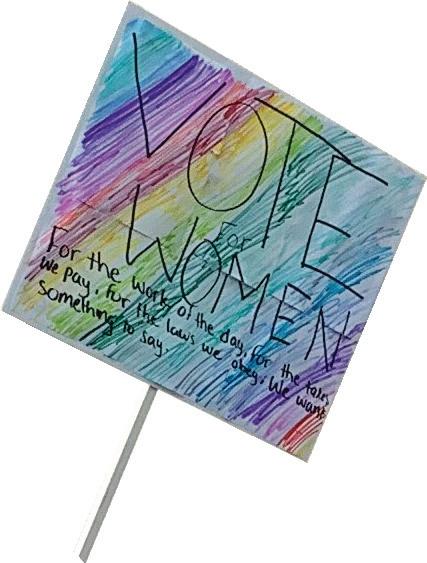
Inspired by the words and imagery of the women’s suffrage movement, seventh graders created their own banners and carried them during Ashley Hall’s Suffragist March.
“It is important that our girls study the women’s suffrage movement every year as a reminder of how powerful a collective community can be and how committing to something larger than one’s self can be empowering, grounding, and enlightening. —DIRECTOR OF THE NAUTILUS PROGRAM AND UPPER SCHOOL ” FACULTY MEMBER CHRIS HUGHES



A NAUTILUS INTERDISCIPLINARY EXPERIENCE
To mark the centennial of the 19th Amendment, seventh graders undertook an interdisciplinary project that examined the national women’s suffrage movement and its prominent leaders in South Carolina. “In social studies, we wanted to extend the discussion to historical texts and figures and the strategies suffragists used to make the argument for their right to vote more powerful,” said Upper School faculty member Joanna Westbrook. “In English, we turned the lens on the South Carolina suffragist movement because of the American Bar Association exhibit that came to campus.” Completing a research guide created by Upper School faculty member Leslie Rowland-Yeh, each student investigated the challenges faced by a suffragist who was active in South Carolina. “I completed a suffrage poster and a one-pager about my suffragist Charlotta Rollin,” said Katie Khan ’26. “I learned that she opened a women’s rights convention with her sister Katherine Rollin.”
As part of their historical research, students analyzed an essay by Ashley Hall alumna Lennerton Girardeau, Class of 1918, who wrote about women’s suffrage in the Cerberus, the School’s literary magazine (read the full essay on page 37). Upper School librarian Emily Davis discovered the work as she searched the archives for 19th Amendment links. The essay provided students insight into the mind of an Ashley Hall student a century ago. “I think it’s important to learn about the 19th Amendment because we need to learn about the history of women,” asserted Margaret Zollweg ’26. “We need to learn more about how Ashley Hall has gotten to where it is now and how the community has changed over time. After all, the founder was a suffragist and an active member of the National Women’s Party!”
As the culmination of their studies, students created banners inspired by the women’s suffrage movement and joined sixth graders for Ashley Hall’s Suffragist March. “What I enjoyed most was hearing everyone’s chants, and everyone being so passionate about the topic,” enthused Charlotte Strickland ’26. “Everyone was holding up their posters and chanting things like, ‘women’s rights’ and ‘votes for women,’ and I thought that was truly special. It has been 100 years since the 19th Amendment was passed, and it shows that accomplishing something can help everyone’s future. It is meaningful because what all of these women went through was extraordinary, and we should be very grateful they risked their lives to get us the right to vote.”
of work

As part of their studies of the women’s suffrage movement and the 19th Amendment, sixth graders researched and created work for a timeline spanning from 1848 to 1920. In addition to writing abstracts about their research topic, they made authentic picket signs and reflected on what they learned. The following selections are excerpts of their creations.
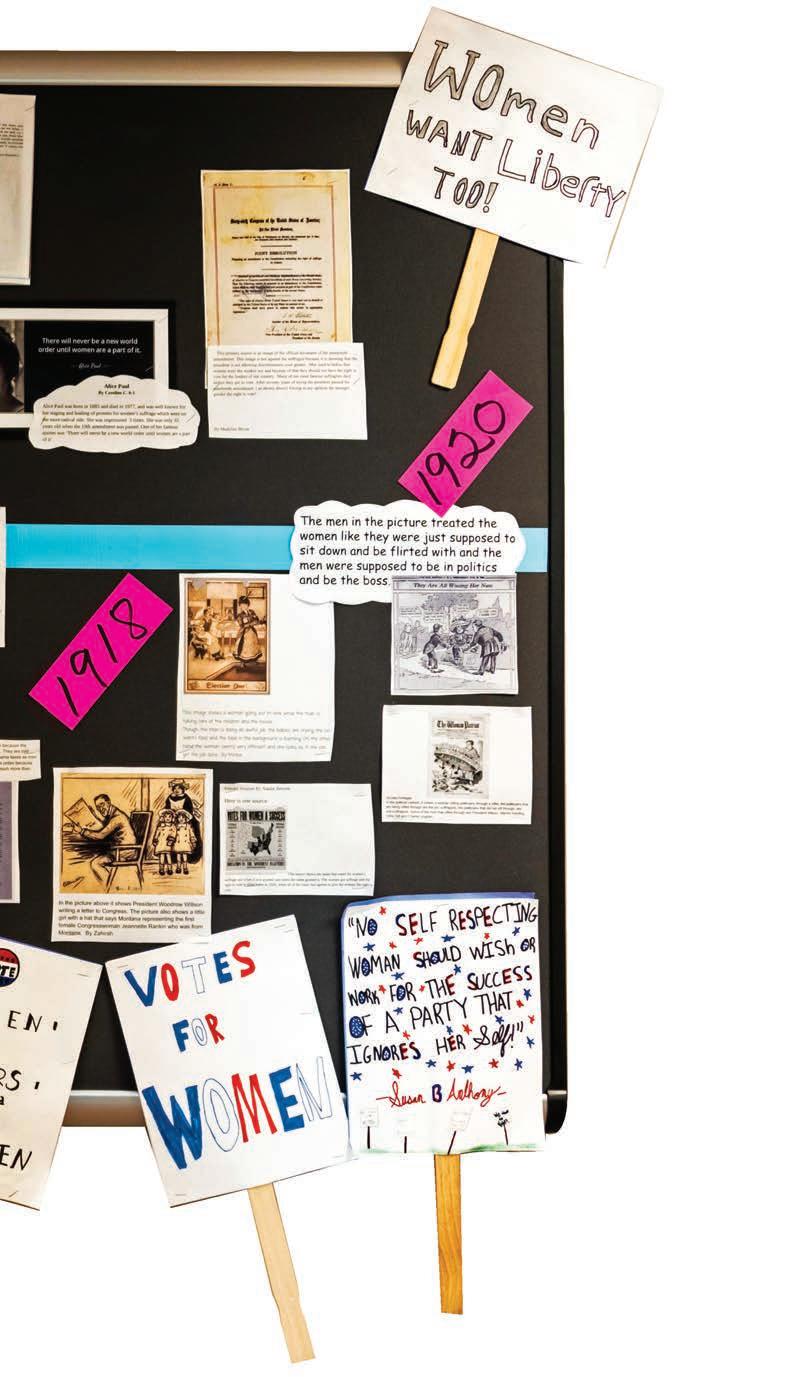
THE LEGACY OF JUSTICE RUTH BADER GINSBURG
By Jennet Robinson Alterman, Class of 1970 A well-known advocate for women’s rights and the founding chair of the Women’s Rights and Empowerment Network, Jennet Robinson Alterman ’70 chairs the City of Charleston Commission on Women. From 2001 until 2013, she served as the Executive Director of the Center for Women, a nonprofit organization that under her leadership grew to become the largest and most comprehensive women’s development center in South Carolina.
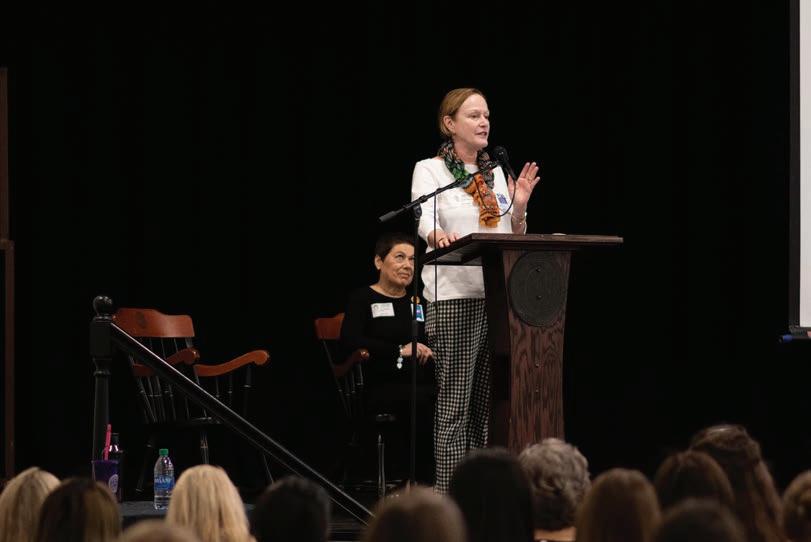
In 1966, I began my freshman year at Ashley Hall, my first experience in an all girls’ environment. I reveled in the atmosphere of learning surrounded by smart, outspoken, and talented peers. They volunteered for jobs, accepted faculty appointments, and created their own versions of female leadership. At the end of my sophomore year, I decided to offer my candidacy for junior class vice president, who was responsible for producing the extravaganza known as the Junior-Senior Dinner. However, another classmate was also interested in the position.
We discussed the campaign and decided that we would run as co-vice presidents instead of competing. Working together, we achieved the best Junior-Senior Dinner in history. As seniors, my talented competition and I continued to power share by strategically targeting the positions where we felt best suited. I ran for president of the Student Council, and she ran for senior class president. Intuitively understanding that we could accomplish more without divisive competition, we won our respective positions and worked collaboratively throughout the year.
Reflecting on the legacy of Justice Ruth Bader Ginsburg, I was struck that my youthful political experiences at Ashley Hall were similar to stories of the late great justice. She often had to work collaboratively with her colleagues and her husband to reach the Supreme Court. In that spirit, I wrote the following op-ed on the notorious RBG.
EMBODY GINSBURG’S LEGACY (published September 21, 2020 in the Charleston City Paper)
The media in the last few days have been full of accolades about Justice Ruth Bader Ginsburg. None of the praise has been hyperbole. This diminutive woman was a giant for justice, never wavering in her commitment to justice for reproductive health care, pay equity, civil rights, access to health care, immigrants, nondiscrimination on the basis of sex. The list goes on and on.
Her entire life encompassed battles for equality. Though brilliant, she had difficulty finding a job after law school in the 1960s because she was a woman, a mother and a Jew. Largely thanks to her determination and legal work, women today do not face these same obstacles.
RBG continued to be the feminist’s feminist at an age when most people start slowing down and considering a softer more reflective life. Yet she thrived in her work as a Supreme Court justice right up to the end of her days.
Especially noteworthy was her ability to manage her profession and her family, often getting no more than three hours of sleep at night. Excelling in every role, she readily admitted, “You can’t have it all,” but she actually did. Her husband, Marty, was her true partner and cheerleader. He never wavered in his support of her and she never took him for granted.
An important part of her legacy was her ability to play well with others. One example is her longstanding friendship with her polar ideological opposite, Justice Antonin Scalia. They attended the opera together and sometimes took to the stage as extras. They both loved gourmet cuisine and traveled together, once riding elephants in India. They and their families toasted many New Year’s Eves together. Justice Scalia once said of her, “They call us the odd couple. She likes opera, and she’s a very nice person. What’s not to like? Except her views on the law.”
Justice Ginsburg and her friend and colleague found common ground in the arts and music. They found that they could disagree without resorting to character assassination or partisan politics. They behaved like adults. If we are to learn anything from their friendship it is to always respect and honor
each other’s differences. I implore our elected representatives and political candidates to take many pages from their book. Set aside the partisan politics and instead come together to address the outsized crises our country faces right now. Craft a robust and unified response to handling the pandemic.
Provide financial help to the Americans most in need. Stop the attack ads and instead put those resources toward protecting the American people before it is too late. Don’t let our planet selfdestruct over the overwhelming climate crisis.
What a tribute it would be to Justice Ginsburg if our politicians could work together for our common good. Let’s pull together for a change. Upon Scalia’s death, Ginsberg wrote, “We are different, we are one. Different in our interpretation of written texts, one in our reverence for the Constitution and the institution we serve.” RBG was able to overcome obstacles, advocate for the underserved, and cross over immense political differences to improve justice in our country. We may not possess her intellect and wisdom, but surely we can strive to emulate some of the lessons she has left us.
May her memory be a blessing.
Balancing Act
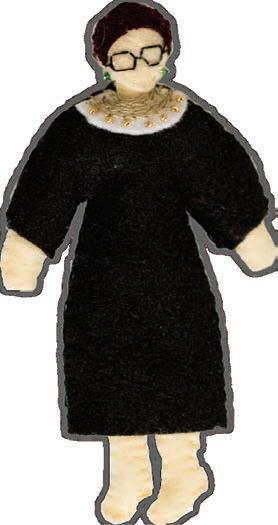
Supreme Court Justice Ruth Bader Ginsburg was renowned as an advocate for gender equality and the rights of women, and Ashley Hall’s Intermediate Program students honored her passing in September with a competition activity that emphasized balance, teamwork, and collaboration. Taking Ginsburg’s quote “Fight for the things that you care about, but do it in a way that will lead others to join you” as inspiration, students first learned more about Ginsburg’s groundbreaking achievements in their humanities classes and then worked in teams to design and build their own “scale of justice” as part of a STEAM activity. In addition to strategizing how to balance their scale with different objects, students made weight estimates and charted their findings. In the spirit of the activity, teachers emphasized that final scores would be based not only on accurate estimates but also on each group’s ability to demonstrate collaborative teamwork, where all members showed guided, patient leadership. The resulting creations and display of cooperation were fitting tributes to the legacy of a woman known for her collaborative nature and quest for balance. “It was a truly awesome day of activities,” emphasized Intermediate Program faculty member Olivia Hipp ’10. “It was one of those ‘This is why I do this’ days.”

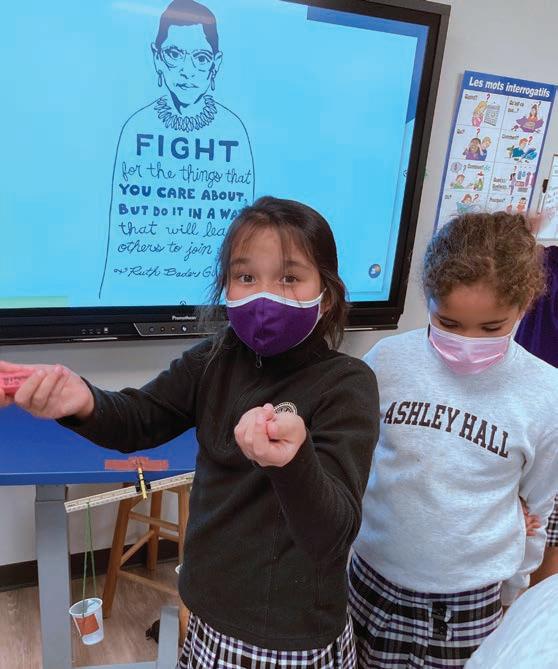
Paying Tribute
Ashley Hall students, faculty, and staff found some creative ways to honor Justice Ginsburg this past fall. In addition to class activities, several young justices, along with their faculty counterparts, proudly took part in the Halloween parade.
In December, Director of Database Management and Online Services Ann Barnett paid tribute to RBG by crafting special holiday ornaments.
Woman’s Part in Democracy
By Lennerton Girardeau, Class of 1918 Ashley Hall student Lennerton Girardeau wrote the following essay for the 1918 edition of the Cerberus, Ashley Hall’s literary magazine. Published a mere nine years after Ashley Hall’s founding, the work reflects the empowerment and voice Miss McBee was already instilling in her students. Girardeau went on to attend Converse College and complete graduate work at the University of North Carolina and the University of Chicago before receiving her master’s degree in psychology and education from Columbia University. She taught at Mississippi State College for Women, Hilda’s Hall in West Virginia, and Martha Washington College in Virginia before returning to Charleston to teach science at St. Andrew’s High School.
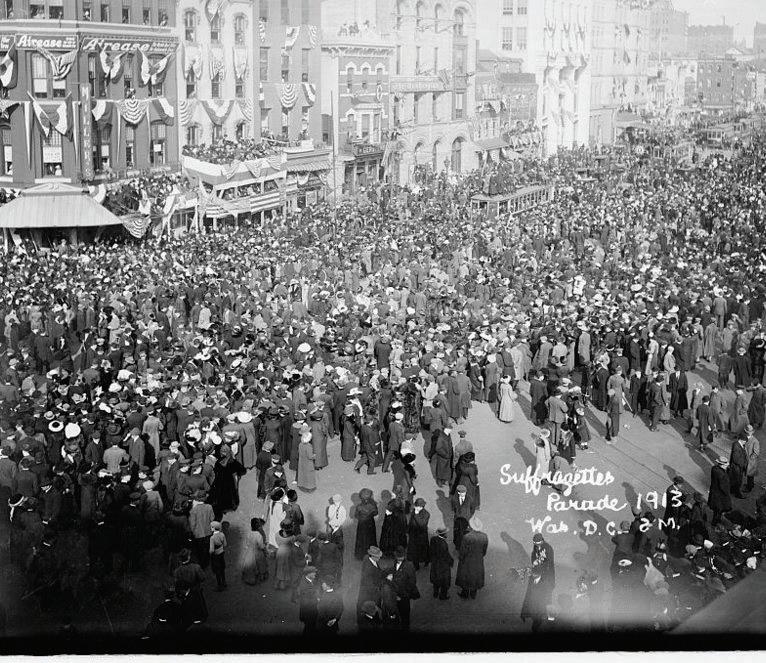
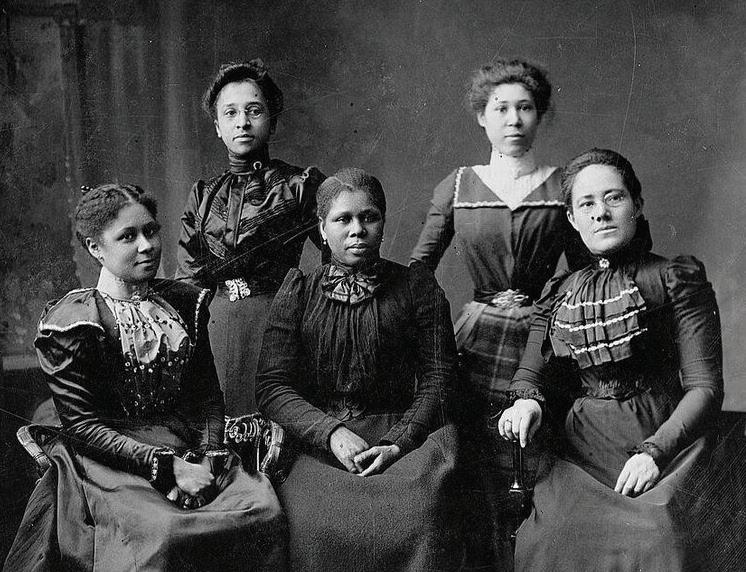
| Clockwise from top: A 1913 women’s suffrage march in Washington, D.C. | Officers of the Women’s League of Newport, Rhode Island, circa 1899 | Women learn to use a voting machine in Chicago, 1919 | Opposite, L-R: suffragists Florence Kenyon Hayden Rector, Mary Dubrow, and Alice Paul hold a banner with a quote by Susan B. Anthony in Chicago, 1920. Photos courtesy the National Archives and Library of Congress
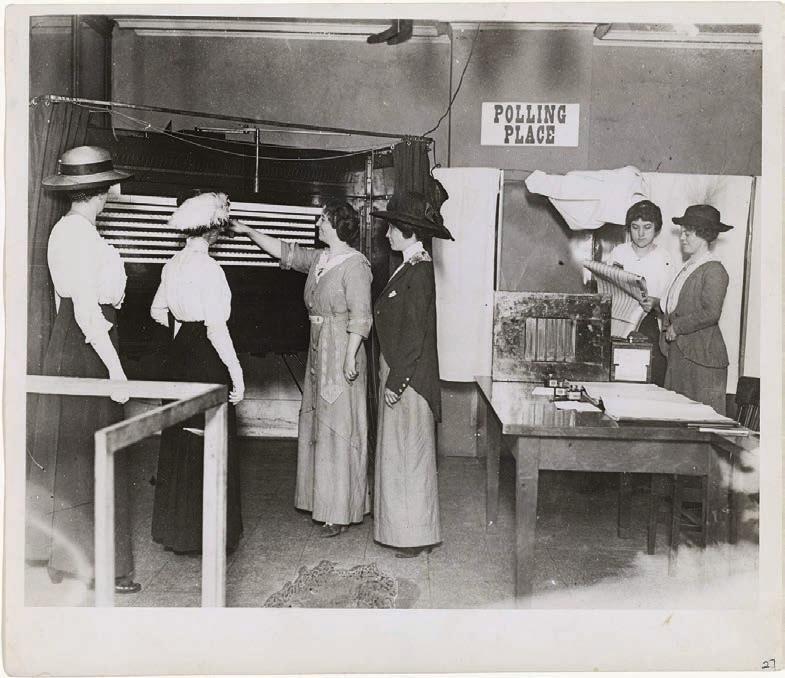
n Tuesday evening, April 30th, Charleston was indeed fortunate in hearing an address by Mrs. Abby Scott Baker, of the National Woman’s Party, from Washington. She greatly impressed it upon the minds of the people why women have the right to vote, and why now, more than at any other time, they should press on to victory in Congress.
Foreign countries expect it of us. We, who talk so much about making the “world safe for democracy,” should first have democracy at home. President Wilson defines democracy as, “Those who submit to authority must have a voice in the government.” Should we think, then, since the President himself made that statement, that women, who have their own particular work to do and part to play in this great world, should continue to let men alone make rules, bring forth, discuss, and finally pass the laws that affect women as much as they do men? Is this democracy? Heretofore the only way for women to obtain a voice in any matter was by going from man to man and imploring them to think and want the same things, and even after such humiliation most of them were refused what they asked for. Is that the practical and judicious way to go about obtaining a public hearing? No! A thousand times no! The correct way and the only way is to stand shoulder to shoulder and help one another to work.
For the past decade we have all heard a great deal of suffragists and suffragettes, but during the last year a new phase of feminism has been brought to our attention. As Mrs. Baker very charmingly expressed it, “I hear that someone has criticized the pickets.” Can you imagine any organization or individual, debarring the President himself, great enough to publicly interest this whole country of ours, and, by so doing, obtain four million dollars’ worth of newspaper space free? Well, just women did that. And how did they do it? Simply by starting something new. And what was this wonderful thing people called “new,” which was really quite old? Merely carrying banners, walking, and standing still. To these persons the name of “pickets” was given. Pickets were arrested and put in the workhouse and solitary confinement for the horrible crime of carrying banners on which were written the President’s own words, and for standing absolutely still on the street where he might see their banners and be reminded of what he had written and said. These silent, patient women were said to “block traffic,” but this accusation was not true in any degree, as was proved later by the movingpictures. Nevertheless, an arrest had been previously planned and announced so it had to take place. We all know of the horrors of Occoquan and the brutal treatment of the women sentenced there. The only real subjects for arrest were the officers who allowed such acts of violence in this civilized age.
Yes, women are always ridiculed for wanting to start anything new. Were they not laughed at when they asked for an education, when they first made public speeches? And even women artists were once shunned. So little else could have been expected when picketing was started.

In future years, however, the world will see its mistake in trying to keep women under submission, and our grandchildren will laugh at their ancestors as we, having seen the broader vision, smile today at stories of Colonial narrow-mindedness.
Women, in their efforts to obtain what they desire, were considerate of their people’s feeling; no one was killed, or even wounded, not one single drop of blood was shed, nor a single heart broken with sadness. How do men obtain what they wish? By death, bloodshed, and the horrible atrocities of war. Now, can women, who act so humanely, be criticized by men? How much truer life would seem if woman was allowed to do her part in democracy.
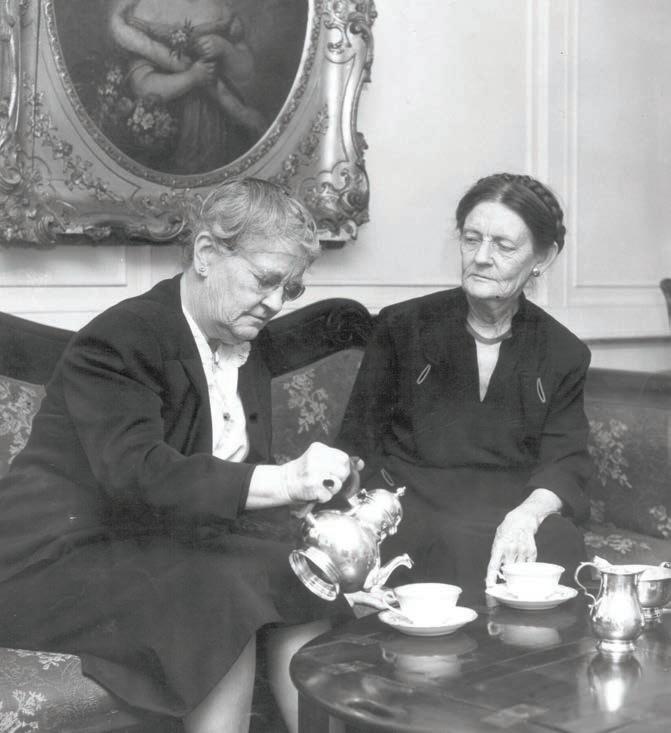
The Other Miss McBee:
A Tale of Two Suffragist Sisters
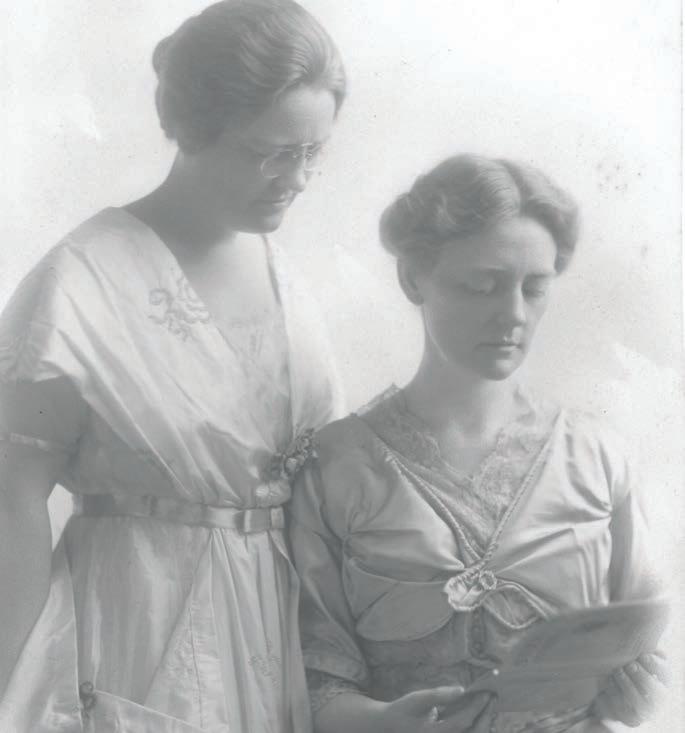
he name looms large in Ashley Hall lore: Miss McBee. She is the founder who, in pursuing her own dream, helped generations of young women to realize dreams of their own.
A passionate advocate for girls to receive a quality education and assume their rightful role as leaders, she built her school into an institution that has endured for over a century and has gained a national reputation for excellence. It was her life’s work and her enduring legacy.
She did not do it alone.
One year after Mary Vardrine McBee planted the roots of Ashley Hall, her sister Estelle joined her to support the new endeavor. A year older and a fellow graduate of the Fairmount School for Girls in Tennessee, Emma Estelle McBee had traveled extensively in Europe and worked in community and social services in New York, including a position on the Board at the Jacob Riis Neighborhood Settlement. With a love of the arts, Estelle was an accomplished actress and percussionist, talents that led her to contribute both as a performer and patron to the Dock Street Theatre and the Charleston Symphony Orchestra. At Ashley Hall, she became Vardrine’s assistant and close confidant, wearing many hats and even teaching English, French, the sciences, and first grade before the sisters retired together in 1949. The School became her life’s work too.
Like her sister, Estelle was most passionate about civic engagement and improving the lives of others, especially women. While Vardrine gravitated to educational-based advocacy groups, including becoming the first woman to serve on the Charleston School Board and the president of the Charleston Free Library (which she helped to found), Estelle immersed herself in the work of the first women’s suffrage organizations in South Carolina. In 1914, she was elected vice president of the Charleston Equal Suffrage League, whose mission was “to safeguard and advance the legal, industrial, and educational rights and interests of women to obtain the franchise for women on equal terms with men.” League members held meetings to strategize, wrote letters, distributed literature, made public addresses, and met
| L-R: Vardrine and Estelle McBee through their years at Ashley Hall. Photos from the Ashley Hall Archives | Opposite: Headline from the April 1, 1915 Charleston Evening Post. Scan from the Post and Courier Archives.

with local organizations. An important feature of their advocacy was hosting nationally known suffragists, including Alice Paul, Elsie Hill, Inez Milholland, and Abby Scott Baker, some of whom drew crowds so large that the events spilled over into the street.
In 1917, the McBee sisters supported a National Woman’s Party (NWP) Conference on Suffrage, called to elect a statewide committee. Held at the Charleston Hotel, the conference featured Vardrine as one of its keynote speakers; local girls dressed in the suffrage colors of purple, white, and gold served as ushers and sold the weekly Suffragist magazine. With Ashley Hall’s Head of School speaking at the conference, it would not have been surprising if some were Ashley Hall students. Later that same year, Estelle was part of a Charleston Equal Suffrage League group that organized a local branch of the NWP to lend direct support to the national cause. Becoming a member of the League of Women Voters, Estelle remained politically active all her life.
Dedicated to the causes they held most dear, Vardrine and Estelle McBee left their own distinct marks on Charleston. As political activists, civic leaders, and educators, they committed their lives to the empowerment of women. That suffragist spirit has infused Ashley Hall since its early days and is still prominent today.

The McBee Society
Mary Vardrine McBee championed the merits derived from a life of value-based philanthropy. Today, she is the patroness of
The McBee Society, an organization of foresighted and generous donors who have included Ashley Hall in their estate plans. By including Ashley Hall in their estate plans, supporters make a lasting impact and ensure that the tradition of an Ashley Hall education continues for another century. This list represents past and present McBee Society members, those who have shared or fulfilled their intentions to support Ashley Hall with an estate gift.
We thank these devoted members for their transformational gift. (Known members as of December 15, 2020. * deceased) Anonymous * Amanda and Roy Maybank
Jennet Robinson Alterman ’70 Terry and Luke McBee
Dot Porcher Amis ’58 Marie Ferrara McGahan ’70
Mary W. Anderson ’68 Pam and Pat McKinney
Marietta Wade Aurand ’41 * Nancy J. Muller ’71 and Warren
Nella G. Barkley Mersereau
Katherine ’65 and William Bates Piper Parker Moffatt ’70
Esther Hoshall Beaumont ’53 Eleanor Hope Moore ’56 *
Ruth Russell Belding ’43 * Jill and Lorenzo Muti Marguerite McLaughlin Bishop ’49 * Kathy and Pete Nistad
Anne Frances Bleecker ’76 Frances K. Palmer ’26 *
Michele G. Booth Caroline Pardue *
Ann Hagerty Boyce ’70 Lee ’73 and Rhett Perry
Gene E. Burges ’64 * Corinne Neely Pettit *
Julius E. Burges * Karen ’79 and Mark Phillips
Jean Martschink Buyer ’51 * Linda Muckenfuss Plunkett ’69
Margaret P. Carr ’29 * Dale C. Poulnot ’73 and Jim F. Condon Robert S. Carr Mabel Stowe Query ’39 *
Lynda Chase ’57 * Caroline H. Ragsdale ’70 *
Helen and Bob * Clement Eva R. Ravenel ’73 Deborah L. Cochelin ’70 Heidi ’74 and Arthur Ravenel Anne de la Morandiere Cooper ’64 Margaret L. Read ’38 * Ann Bacot ’80 and Belk Daughtridge Jenny and Jerry Reves
Harriett B. Daughtridge ’70 Sally ’66 and Edmund Rhett
Emmie Aichele Dawson ’70 Artie Richards
Ann W. Dibble ’70 Ms. Keith C. Richardson
Susan Estey Edgerly ’43 * John M. Rivers, Jr.
Evelyn A. Florance * Cliff P. Robertson *
Nancy Friday ’51 * Mary Moore Roberson ’57 Nora Alston Flynn ’53 * Judy Webber Ross ’53
Alice ’61 and Mike Gaines Bobbie Gail ’54 and Herb Rothschild
Celinda H. Harkness ’59 * Katherine B. Salmons ’71 Virginia Clyde Douglass Harper ’47 Iona and Paul Sanders
Jane * and T. Fleetwood Hassell Beverly Ann ’54 * and John Settle * Jane ’47 and Max Hill Mary Mahony Smith ’37 Laurie Arnold Host ’73 Peggy ’68 and Jim Stallworth
Sally ’61 and Charles Hubbard Laurel Gale Stewart ’50
Fern Karesh Hurst ’64 Shana and Bobby Stockton
Martha Rivers Ingram ’53 Martha and Will Story
Amy E. Jenkins ’82 Virginia and Thomas Thorne *
Joan ’47 and Robert Kaselitz Mardelle and Tommy Thornhill* Elizabeth C. Keith * Alice and Mike White
Trish and Tommy Kirkland Elizabeth R. Williams ’45 * Croft and Hugh Lane Elizabeth S. Williams ’34 * Daisy Leland * Margaret A. Williams ’34 *
Anne Brockinton Lee ’70 Porter Williams, Jr. * Barbara Angel Levin ’50 Caroline M. Williamson ’70 Melissa and Jan Levitan Martha Mohl Wolf ’56
Elizabeth Rivers Lewine ’54 Beautsie ’63 and Fred Zahrn *
Margaret and Ian MacDonald Barbara and J. Conrad Zimmerman, Jr. Merlee Ann Madren ’56 Elephare Dwelle Zimmerman ’40 *










